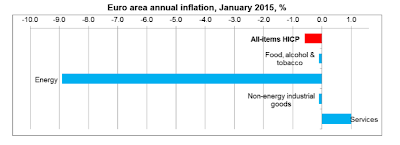Eurostat released HICP Harmonized Index of Consumer Prices statistics today.
In spite of promising that deflation would not hit again, here we are, and for the second month too.
 Euro area annual inflation is expected to be -0.6% in January 2015, down from -0.2% in December 2014 according to a flash estimate from Eurostat, the statistical office of the European Union. This negative rate for euro area annual inflation in January is driven by the fall in energy prices (-8.9%, compared with -6.3% in December). Prices are also expected to fall for food, alcohol & tobacco (-0.1%, compared with 0.0% in December) and non-energy industrial goods (-0.1%, compared with 0.0% in December). Only prices for services are expected to increase (1.0%, compared with 1.2% in December).
HICP vs. Year Ago

click on any chart for sharper image
HICP Components by Month

HIPC 2005 to 2015 History

Even Germany in Deflation
The BBC reports Denmark, Deutschland and deflation: strange times for EU.
 New official figures from Germany show that prices have fallen, by 0.5%, over the previous 12 months.
Meanwhile the Danish Central Bank has cut one of its main interest rates for the second time in a week.
It is a rate paid to commercial banks for excess funds parked at the central bank. It was already below zero. Now it is even lower – minus 0.5%.
It means banks have to pay to leave money at the central bank, above certain specified limits.
Negative interest rates are another example of the strange financial world that has emerged in the aftermath of the financial crisis.
What is the connection between falling prices – or deflation – in Germany and the Danish central bank? It is about Denmark’s 35-year policy of tying its currency, the krone, to the euro, and before that to the German mark.
That peg has come under increasing strain as the European Central Bank, the ECB, has taken steps to combat deflation.
Denmark PegÂ
How long will Denmark be able to keep its peg to the euro?
The BBC says “Denmark is a smaller financial system and it is not an established magnet for internationally mobile money in the way that Switzerland is.” The presumption is Denmark can keep its peg because its not an international player.
I say watch what happens if hedge funds start monkeying around with the Danish krone in size. We could easily see another Swiss-style event, albeit with smaller repercussions given that the krone is not the same hotbed of foreign mortgage obligations as Switzerland.
Mike “Mish” Shedlock
Â

